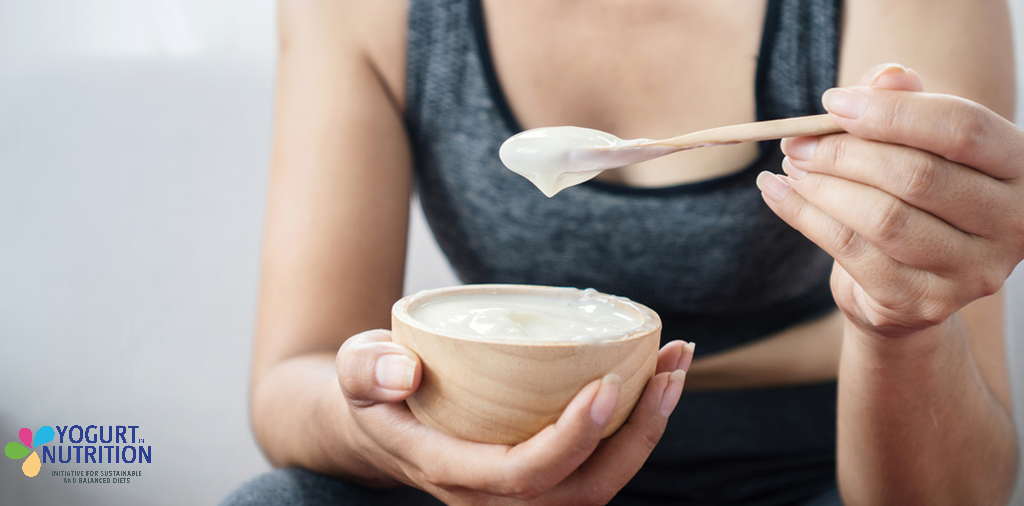Yogurt is widely known for its health benefits. Being a nutrient dense food, it is packed with vitamins, minerals such as calcium, and proteins. The physical and biological properties of milk proteins in yogurt differ from those in raw milk, which could improve their digestibility.
Because consuming proteins that are both digestible and easily absorbed is necessary for muscle mass maintenance, yogurt could be an interesting source of proteins. As a high-quality protein source, milk has been extensively studied for its benefits on muscle health, but the role of milk proteins in yogurt remains unclear (1).
The digestion & absorption of yogurt proteins may be better than that of milk proteins
Milk mainly contains two kinds of proteins: casein and whey protein.
When making yogurt, milk undergoes heat treatments and lactic acid fermentation, both of which partially break down these proteins, potentially making them easier to absorb and digest.
Some studies reported a slower absorption rate of protein in yogurt than in milk. This could be due to the yogurt’s longer gastric emptying because of its higher viscosity compared with milk. Thus, yogurt processing ensures low viscosity for an optimal absorption.
On the other hand, studies examining blood Total Amino Acids (TAA) after dairy consumption reported higher TAA after yogurt or fermented milk absorption than raw milk (2). Similar results were found for unfermented milk acidified by the addition of lactic acid.
These findings suggest a role of yogurt acidity and texture in improving proteins absorption and digestion.
Yogurt proteins intake may enhance muscle protein synthesis
Interventional studies using marked amino acid to track Muscle Protein Synthesis (MPS) after meals found more marked amino acid incorporation into muscle proteins after consuming yogurt than with unfermented milk or unfermented acidified milk, suggesting an improved MPS. This was consistent with a higher increase of blood amino acids after yogurt ingestion (3).
After meals, the increase in blood amino acid and insulin stimulates skeletal MPS by triggering two cellular pathways (PI3K/ Akt mediated pathways). Interestingly, studies showed an increased activation of these pathways after consuming yogurt compared to unfermented milk.
While these studies suggest an acute post-meal MPS enhancement, other studies yielded more contrasted results regarding long-term yogurt consumption and its association with skeletal muscle mass maintenance or increase.
Yogurt could be beneficial for muscle health via lactic fermentation
In addition to being a good protein source, yogurt could help muscle via lactic fermentation and the gut-muscle axis – the relationship between intestinal microbiota and skeletal muscle.
Studies investigating the relationship between intestinal microbiota and muscle mass have reported a positive correlation between the presence of lactic acid bacteria in intestinal microbiota and muscle mass (4).
And according to a recent review, the age-related gut microbiota disruption and the increased intestinal permeability might explain the decreased protein absorption and chronic inflammation resulting in sarcopenia (age-related loss of skeletal muscle mass). Additionally, lactic bacteria produce bioactive peptides during fermentation that might exert anti-inflammatory effects and thus improve MPS (5).
However, while probiotics supplementation with lactic acid bacteria and bifidobacteria enhanced both muscle mass and strength, no study was conducted using S. thermophilus and L. delbrueckii subsp. bulgaricus supplementation – the bacteria used for yogurt production.
While these findings are promising, further studies are needed to establish a clear link between yogurt consumption and muscle health benefits.
“Among the dairy foods considered a high-quality protein source, yogurt may be a particularly good source for increasing muscle mass […]. However, since there is little solid evidence for this benefit of yogurt, especially in humans, further efforts are needed. – ”Sumi K, et al – 2023
Additional references:



